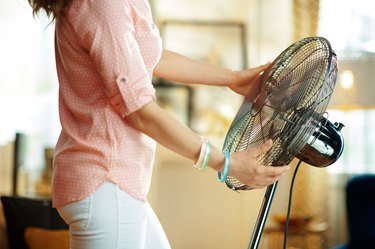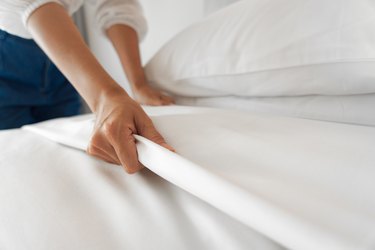
Heat waves are challenging for just about everyone, but they can be especially uncomfortable (not to mention dangerous) if you don't have air conditioning or need to limit how frequently you run your home's cooling system.
Many Americans find ourselves in that situation: One in three U.S. households have difficulty paying for energy and utility bills, according to a 2018 report by the U.S. Energy Information Administration (EIA). As a result, 11 percent of households keep their homes at unhealthy temperatures, per the EIA — including during heat waves.
Video of the Day
Video of the Day
Fortunately, there are smart — and easy — tweaks that can help you stay relatively cool, even in the midst of surging heat. Here, eight ways to cool down your home without an air conditioner.
1. Get the Most Out of Your Fan
You can make your indoor fans cool rooms even more efficiently by placing frozen water bottles or a cooler filled with ice directly in front of them, says Shane Dutk, founder and general manager of Review Home Warranties, a website that assesses homeowners' home warranty options. You can also drape a towel dampened with cold water over the fan's frame. These tactics will immediately spread cooled air.
Ceiling fans are particularly key, as they create a wind chill effect. Reverse the motor to move the blades in a counterclockwise rotation to create a breeze effect in the summer, says Mark Dawson, chief operating officer at One Hour Heating and Air Conditioning, which installs, maintains and repairs heating and air conditioning systems.
2. Take Advantage of Night Breezes
When dusk hits, open all the windows and, if you can do so safely, the doors — this will promote air circulation and allow cooler air to enter your home, says Lina Velikova, MD, PhD, medical advisor to MedAlertHelp.
Place box fans close to the doors and windows — they can act as an exhaust system that pushes the heat out of your home. At dawn, close all those windows up again, and also close all your blinds and curtains, to diminish the amount of sun entering your home.
3. Cover Your Windows
The idea is to keep direct sunlight from entering your home. If your regular blinds and curtains aren't quite doing the job, you may want to invest in blackout curtains, which serve as natural room insulators.
When you're shopping, look for medium-colored drapes with white plastic backings — these can reduce heat gain by about 33 percent, according to the Department of Energy (DOE).
If new curtains aren't in the budget, try this: Place aluminum foil over windows (shiny side out), cover with cardboard and then drape blankets or towels over top.
4. Place Plants Strategically
They can block some of the sun and keep rooms cooler throughout the day, Dawson says. Plants actually release excess water into the air from their leaves to cool themselves — and everything around them, too.
Tip
What You Eat and Drink Matters, Too
When it’s really hot, you’re at much higher risk of becoming dehydrated, as excessive sweating is your body’s way of trying to cool down. Follow these tips to keep hydrated:
- Drink plenty of fluids.
- Seek out fruits and veggies with high amounts of water (think cucumber, melons, leafy greens, even raw onions!) to help with hydration, says Nikola Djordjevic, MD, medical advisor for HealthCareers.co.
- Avoid drinking alcoholic beverages and caffeine during a heat wave, Dr. Djordjevic says. Here’s why: They're both diuretics, which means they can dehydrate you and deplete your body of water, as well as other essential nutrients.
5. Cut Unnecessary Heat Sources
Who needs to cook during a heatwave? It makes sense to avoid using appliances like your oven and stove, especially during the day, Dr. Djordjevic says. Instead, grill outdoors, or, if you must cook inside, use slow cookers or Instant Pots, which will prevent your kitchen from turning into a sauna.
Another tip: Replace all incandescent light bulbs with fluorescent light bulbs, which emit less heat, and are the most energy-efficient option out there.
Related Reading
6. Barricade in the Basement
If you've got a finished basement, consider seeking shelter there whenever a heat wave hits. During the summer, hot air rises, and consequently, the upper stories of our homes become hotter. "Ground floors are significantly cooler, and basements oftentimes are at a perfect temperature if you're looking for a little livable oasis," Dr. Djordjevic says.
7. Freeze Your Bedding

Throw your pillows and sheets in the fridge or freezer during the day, then bust them out right before bed, Dr. Djordjevic recommends. (Simply roll them up in any large plastic or paper bags you have around the home.)
You can even stay prepared for the week by freezing a couple of sheets in a plastic bag, and removing them when needed.
8. Consider Installing Evaporative Coolers
If you live in an area that tends to have low humidity, you may want to consider evaporative coolers, window units that remove heat from the environment by using water evaporation to create cool air, says Cisco DeVries, an energy expert, former aide to the U.S. Secretary of Energy during the Clinton Administration and CEO of OhmConnect.
These devices cost about half as much to install as central air conditioners and use only about one-fourth of the energy, per the DOE. And unlike central AC, which just recirculates the same air, evaporative coolers provide a steady stream of fresh air into the house.
9. Add a Whole House Fan
If you live in a multi-story home, you can buy and install a whole house fan for less than $2,000. It's installed in your attic and creates negative pressure by drawing the hot air in your home into the attic, DeVries notes. This negative pressure then draws in cooler air from outside, cooling down your home.
While you're up in the attic, put in some insulation, which will help keep your house warm in the winter and cool in the summer.
Is this an emergency? If you are experiencing serious medical symptoms, please see the National Library of Medicine’s list of signs you need emergency medical attention or call 911.